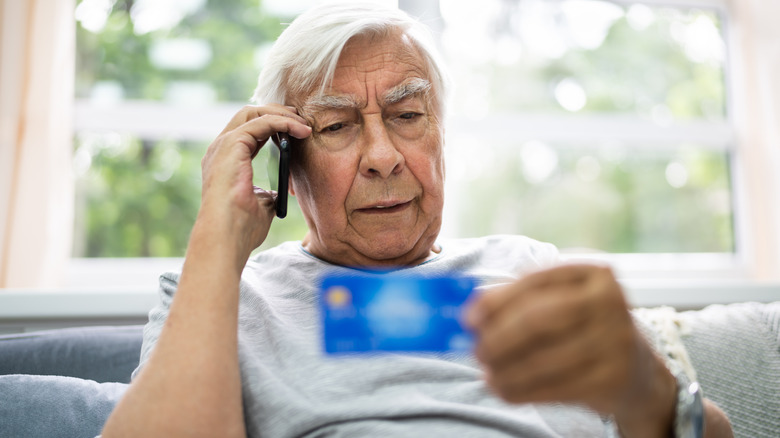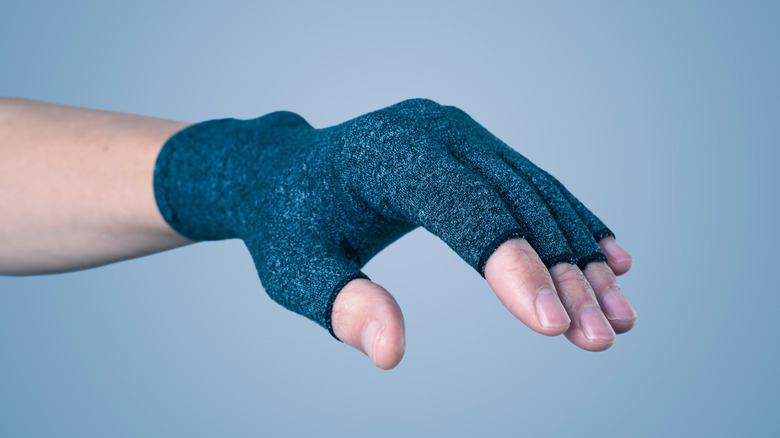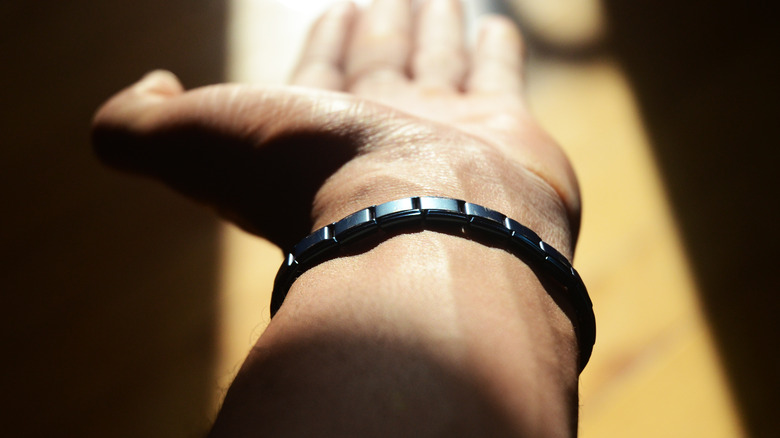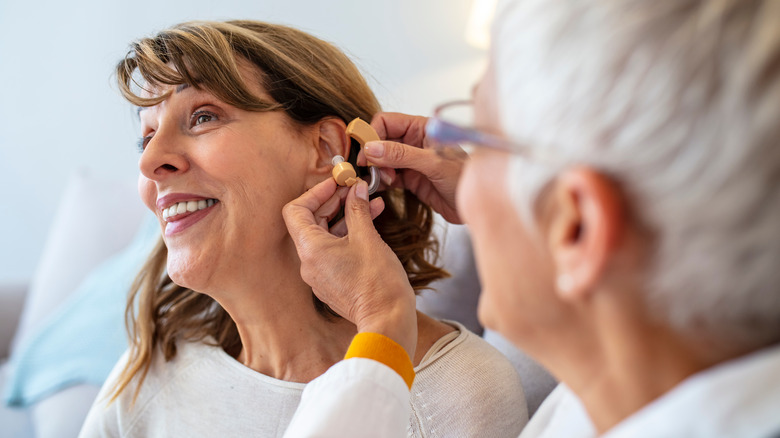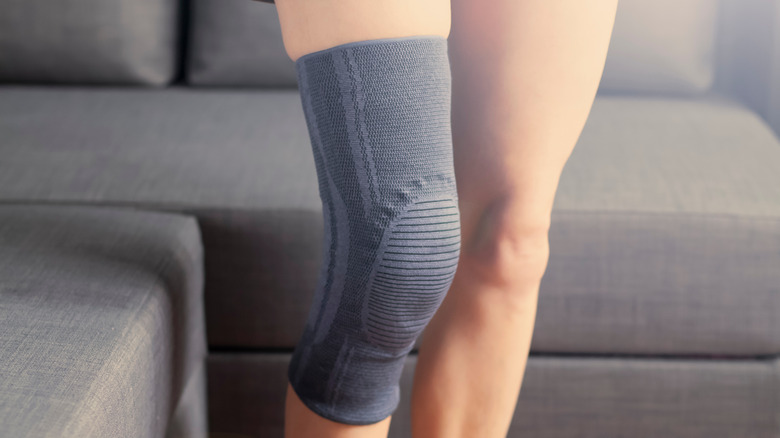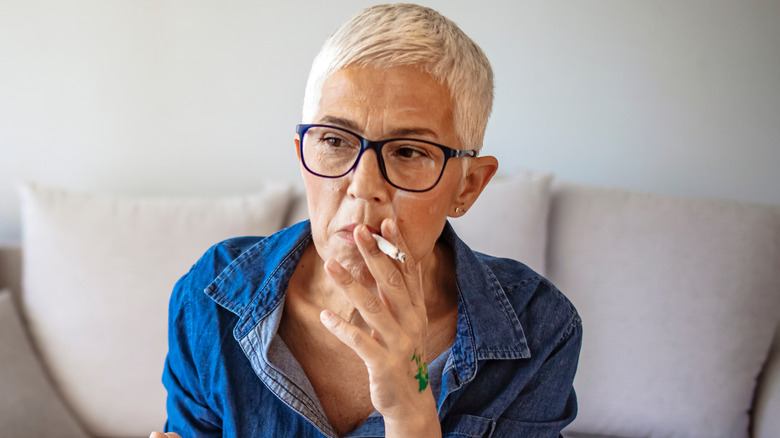Health Products For The Elderly That Are Nothing But Scams
The elderly care product market is loosely regarded as the industry addressed to marketing, manufacturing, and selling products that are designed to meet the various needs and requirements of individuals as they surpass "middle age." That, of course, varies, depending on whom you ask. Some say that the term "elderly" applies to adults age 65 and older, while others, such as the American Association of Retired Persons (AARP) consider their demographic to be 50 and above. Regardless of who may or may not fit under the "elderly" umbrella, the elderly care products industry is enormous. In 2019, it had a market size of $832.8 billion, and analysts predict a compound annual growth rate of 3.9% through 2025, according to a press release published by Business Wire.
A great many elderly care products are not merely useful or helpful but downright necessary for some. These include wheelchairs and other modes of mobility assistance, medically-prescribed anatomical support devices such leg braces, and clothing designed for incontinent adults (via Transparency Market Research).
Unfortunately, however, some products marketed to the elderly are nothing but scams, according to the FTC. This is particularly true for health products, which make up the vast majority of products marketed to the elderly, right alongside luxury products (via Fast Company). Join us as we take a deep dive into why that is, plus some of the more egregious elderly health products scams we've seen.
The elderly are targeted for a few reasons
Health product scams tend to target those over age 65, according to Lumen Learning. According to the Association of Certified Fraud Examiners, the reason is that the elderly "may be lonely, willing to listen and are more trusting than younger individuals." The National Caregivers Library explained that older individuals are also more likely to have accumulated savings over the years (a "nest egg"). In addition, there's a bit of a cultural divide. Older boomers and members of the so-called "lost generation" (people born in the 1930s and '40s) were "generally raised to be polite and trusting," making them less likely than a younger person to close the door on a solicitor or disbelieve what they might be reading on the internet or in a product circular (via National Caregivers Library).
Further, the elderly may be more inclined to want to believe false promises made with regard to products offering improved health and vitality. Since elderly individuals may be concerned about their own cognitive decline, they're also less inclined to report fraud, which brings up perhaps the cruelest reason that the elderly are targeted by health product scams. Aging is associated with cognitive decline. In fact, a 2019 study demonstrated that one possible sign is "low scam awareness" (via AARP).
Arthritis gloves
Osteoarthritis is a painful joint condition that tends to affect the elderly, with as many as 40% of adults expected to develop osteoarthritis of the hands by age 85, according to a 2017 study published in the Journal of Arthritis and Rheumatology. That makes "therapy gloves" for arthritis a very big business, and not necessarily a savory one, according to registered nurse Elizabeth Hanes. Hanes reviewed current clinical research (through to July 2021) on their effectiveness and concluded that "clinical studies into the effectiveness of therapy gloves for arthritis have failed to deliver any statistically meaningful results" (via HealthGrades).
There are three main categories of arthritis gloves: compression, copper-infused, and heated. However, all rely on compression. Although some of the studies suggested that compression gloves, which have been marketed to the elderly since the 1970s, may help to relieve hand swelling and increase hand strength, such results should be taken with a grain of salt because the studies were small and much of the data was based on qualitative assessments by the glove-wearers themselves, rather than objective criteria (e.g., scans).
Furthermore, compression gloves could worsen the symptoms of other health conditions to which the elderly may be prone, including carpal tunnel syndrome and contact dermatitis. Before you spend a penny on a glove that claims to relieve arthritis symptoms, consider speaking to a trusted healthcare provider.
Magnetic bracelets
Since ancient times, people have believed — or, perhaps more accurately, people have been wanting to believe, that wearing a magnetic bracelet can do wonders for health and vitality, according to Healthline. The operative theory is that magnets, which can attract various metallic items to them, and sometimes with great force, are imbued with a life force all their own. However, by the end of the 19th century, magnets had already been decried as "worthless, even dangerous therapeutic devices."
So, what are we doing here then? Well, there are always going to be people who question or even ignore the progress already made by science, and that's precisely what happened during the 1970s, when a non-medical doctor, Albert Roy Davis, Ph.D., began making the claim that magnetic energy is an untapped miracle resource, able to relieve arthritis pain, treat infertility, and even cure cancer. Yikes.
Thanks to Dr. Davis, magnetic products like bracelets, marketed in part to those who, as a demographic, are most affected by arthritis — the eldery — have become a "multibillion-dollar industry" (via Healthline). Nevertheless, science has come up with little to no evidence that magnetic bracelets can help with arthritis pain (nor treat infertility or cure cancer).
Over-the-counter hearing aids
Age-related hearing loss is practically inevitable, according to the Hearing Health Foundation, which states that by the time you reach 75, there's about a 50/50 chance you'll have some level of "disabling hearing loss." Many with age-related hearing loss would be able to benefit from the use of hearing aids — if only they are willing to use them. Per the Hearing Health Foundation, fewer than one in three adults over the age of 70 have tried them.
Someday, in what appears to be the not-too-distant future, you'll be able to buy hearing aids over the counter. However, as of this writing, none of the "hearing devices" that can currently be purchased over the counter are designed to address actual disabling hearing loss, according to the National Institute on Deafness and Other Communications Disorders (NIDCD). Rather, they merely amplify one's existing, presumably normal, ability to detect voices and other sounds.
Nevertheless, many such devices are marketed to the elderly demographic. Fortunately, the FDA is in the process of shutting down marketing practices that would suggest or imply that these devices can help with age-related hearing loss. One reason is that "[over-the-counter] hearing aids will be an alternative to today's FDA-regulated hearing aids, which are currently only available from hearing health professionals." In connection with that, the FDA is also establishing new regulations applicable to all products intended to be used by people with age-related hearing loss.
Over-the-counter or telemarketed knee and back braces
The chances of developing chronic pain increase with each passing decade, according to Health Central. So Imagine how comforting it would be to know that when your "trick knee" or your "bad back" starts acting up — again — you can easily pop over to CVS to pick up a brace to address your discomfort and perhaps even keep you safe from injury. Unfortunately, Consumer Reports has done quite a bit of research into both the safety and efficacy of back and knee braces that are available to purchase over the counter — that is, without having obtained an official diagnosis and without having been properly fitted for the brace by a healthcare professional. And the news is not so comforting.
As Consumer Reports revealed, such back braces and knee braces that can be purchased over the counter without a doctor's prescription "may not help" with the pain you're experiencing. In fact, they "may even cause additional damage." Worst of all, some of these braces are marketed aggressively to the elderly via telephone soliciting. "Out of the blue, someone calls to say that your doctor has recommended a device — often a back or knee brace — and asks for your insurance info," Consumer Reports explained. Scammers do this for a number of reasons — to get your money directly, use your medical identity, or make fraudulent insurance claims.
Non-prescription erectile dysfunction meds
Erectile dysfunction (ED) refers to an inability to maintain an erection for purposes of having sexual relations. According to the authors of a research paper published in the Journal of Urology, the prevalence of erectile dysfunction in men over 40 is at least 52%, with the rates jumping significantly higher after age 70. According to U.S. Pharmacist, at least 50% of Americans over the age of 60, and 25% over the age of 80 report that they're sexually active. It's not surprising, then, that the study authors also noted that erectile dysfunction can have a significant negative impact on quality of life. Nor is it surprising that elderly men are seen as a hot target for companies manufacturing ED drugs that can be purchased without a prescription (via FDA).
Unfortunately, there is little clinical evidence that ED drugs that are available over-the-counter (OTC) even work, according to Medical News Today. And if an OTC ED drug is actually effective, it may be because it contains undisclosed ingredients — such as the active ingredient in certain prescription ED drugs, which could be dangerous for those whose doctors have ruled out prescription ED drugs for safety reasons (via FDA). In some cases, such OTC drugs may interact negatively with certain prescription drugs that are frequently taken by the elderly.
Filtered cigarettes
Most people are well-aware of the dangers of smoking cigarettes, according to the American Cancer Society. Nevertheless, a great many Americans smoke despite the warnings, per the Centers for Disease Control and Prevention (CDC). Specifically, close to 14% of all U.S. adults aged 18 or older are current smokers. This translates to about 34.1 million adult smokers in the U.S, of which 25% are over the age of 45, and of which 8.2% are over the age of 65.
Many older adults started smoking before they were aware of how dangerous smoking actually was, according to a 2013 research paper published in JAMA. While many such ones have turned to filtered cigarettes because they (mistakenly) believe that doing so will help to mitigate the risks associated with smoking, there is no evidence that filtered cigarettes are effective at reducing those risks, according to a paper published by the journal of Tobacco Control.
"Filters and innovations to filters have been consistently marketed as a means to reduce smoking-related health risks," according to the authors of the paper. However, the "overwhelming majority of independent research shows that filters do not reduce the harms associated with smoking." Moreover, smoking filtered cigarettes may actually be more dangerous to smokers than non-filtered cigarettes. This is because filtered cigarettes may encourage smokers to inhale smoke more deeply into their lungs. In addition, filters, themselves, may contain toxic substances that are then inhaled by the smoker, per a report by the CDC.
Hair-loss products
Another inevitability of aging is hair loss. By age 50, around 85% of men are already experiencing some level of age-related hair loss, according to the American Hair Loss Association (via Healthline). And it's not just men. According to the Cleveland Clinic, an estimated 50% of all women will experience noticeable hair loss as they age, and believe it or not, this starts by around age 40.
Although hair loss can happen at any age and for a variety of reasons, the fact that age-related hair loss looms closer with each passing year has made the market for anti-hair-loss and hair-enhancing products a huge industry (via IBIS World). But the truth is that most hair-loss treatments don't work. Any money you spend on them is potentially money you're just throwing away, according to the Dermatology and Mohs Surgery Institute (DMSI). These include special hair brushes, which are meant to stimulate the follicles to encourage hair growth, and supplements. "While supplements can support strong hair quality, [they] cannot grow your hair back," per the DMSI. But the most prevalent hair loss scam, according to DMSI, is snake oil — yes that's what it's actually called. Supposedly, snake oil (a blend of oils) moisturizes the scalp and forms a barrier between the hair and harmful chemicals (via FeelGoodStyle). However, there is no evidence that it actually promotes hair growth or reverses existing hair loss.
The only hair-loss treatment medication available over-the-counter that has been approved by the FDA is minoxidil, a topical treatment known commercially as Rogaine and Theroxidil. However, it is not guaranteed to work, according to Everyday Health.
Prescription medications from 'rogue online pharmacies'
According to the National Council on Aging, one of the most prevalent health product scams perpetrated against the elderly is the sale of counterfeit prescription drugs (via Association of Certified Fraud Examiners). "As prices for prescription drugs increase, seniors look the internet to find cheaper prices for their medications," reported the Association of Certified Fraud Examiners. "Unfortunately, fraudsters are aware of this and set up websites that advertise cheap prescription drugs which are usually counterfeit." Counterfeit drugs may be ineffective at treating the medical condition for which the actual drugs were prescribed. Moreover, they can exacerbate or even cause their own set of medical issues. As the FDA makes abundantly clear: "Buying prescription drugs from rogue online pharmacies can be dangerous, or even deadly."
The best way to ensure that you or your elderly loved one does not fall victim to a counterfeit prescription scam is to avoid purchasing medications other than through a legitimate brick-and-mortar pharmacy. However, the FDA does note that some online pharmacies are, in fact, legitimate, and offers the BeSafeRX program as a way of helping individuals purchase actual (non-counterfeit) prescription drugs online.
COVID-19 treatment, prevention, and cures
COVID-19 has no known cure, nor any prophylaxis that is known to be close to 100% effective, as of this writing. Yet companies attempting to scam the elderly — whose age, alone, puts them at the greatest risk of severe COVID-19 — have been keeping both the Federal Trade Commission (FTC) and the Food and Drug Administration (FDA) busy throughout the course of the pandemic. According to Senior Living, the FTC and FDA have issued warnings against at least seven companies that they allege have been "misbranding products as treatments or preventives against coronavirus." These include "teas, essential oils and colloidal silver."
While it would not be possible to identify every single scam COVID-19 treatment or preventative out there, the FDA issued a statement to remind consumers to "be cautious of websites and stores selling products that claim to prevent, mitigate, treat, diagnose or cure COVID-19." The statement continued, Fraudulent COVID-19 products may come in many varieties, including dietary supplements and other foods, as well as products purporting to be drugs, medical devices or vaccines. Products that claim to cure, mitigate, treat, diagnose or prevent disease, but are not proven safe and effective for those purposes, defraud consumers of money and can place consumers at risk for serious harm."
Undoubtedly, this is something that elderly individuals should keep in mind whenever they may feel tempted to try a particularly "convincing" product purporting to treat, cure, or prevent COVID-19 or the transmission of the coronavirus that causes COVID-19. Remember, getting vaccinated against COVID-19 is the safest and most effective way to prevent severe infection and death (via CDC).

